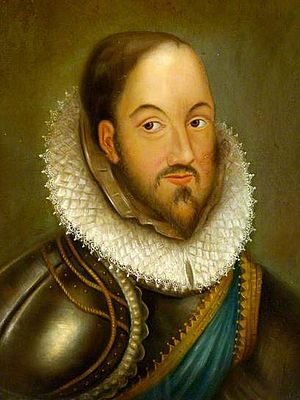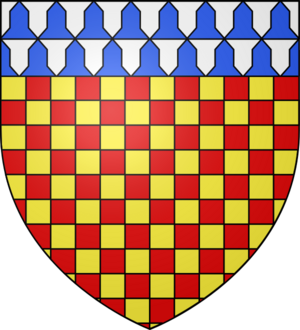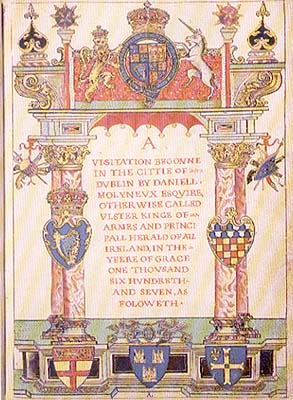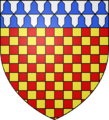Arthur Chichester, 1st Baron Chichester facts for kids
Quick facts for kids
The Lord Chichester
|
|
|---|---|

Anglo-Irish School portrait in the collection of Belfast Harbour Commissioners
|
|
| Lord Deputy of Ireland | |
| In office 1605–1616 |
|
| Preceded by | Sir George Cary |
| Succeeded by | Sir Oliver St John |
| Personal details | |
| Born | May 1563 Raleigh, Devon, England |
| Died | 19 February 1625 (aged 61) London, England |
| Spouse | Lettice Perrot |
| Children | Arthur |
| Alma mater | Exeter College, Oxford |
Arthur Chichester, 1st Baron Chichester (born May 1563 – died 19 February 1625) was an important English leader and soldier. He was known as Sir Arthur Chichester between 1596 and 1613. He served as the Lord Deputy of Ireland from 1605 to 1616. This role meant he was the King's main representative and governor in Ireland.
Chichester played a big part in making Belfast grow into a major city. Today, Belfast is the capital of Northern Ireland. Some streets in Belfast, like Chichester Street, are named after him and his family.
Contents
Early Life and Family
Arthur Chichester was born in May 1563 in Raleigh, Pilton, England. His father was Sir John Chichester, a well-known gentleman from Devon. Sir John was a naval captain and served in the English Parliament.
Arthur's mother was Gertrude Courtenay. Her family, the Courtenays, were also very important in Devon.
Military Career
Arthur Chichester studied at Exeter College, Oxford. In 1588, he commanded a ship called HMS Larke. This was during the time when England was fighting against the Spanish Armada.
In 1595, he joined Sir Francis Drake on his last trip to the Americas. A year later, he fought in the raid on Cádiz in Spain. For his bravery there, he was made a knight.
In 1597, he went to France to help King Henry IV fight against the Spanish. He was hurt during the Siege of Amiens, where the French captured the city. King Henry also knighted him for his courage.
In Ireland
Chichester's work in Ireland began in 1598. He was made Governor of Carrickfergus. This happened after his brother, Sir John Chichester, was killed in a battle there.
Nine Years' War
During the Nine Years' War, Chichester led British troops in Ulster. He used a tough strategy to defeat his enemies. He surrounded the forces of The Earl of Tyrone with military camps. This made it hard for the Earl's troops to get food and supplies.
Chichester believed that cutting off food was more effective than fighting. He once wrote that "one winter's famine" would do more harm than "a million swords." These methods were very harsh and made him unpopular with many Irish people. Eventually, Lord Tyrone had to destroy his own capital at Dungannon and leave it.
Lord Deputy of Ireland
After the war ended, Arthur Chichester became the Lord Deputy of Ireland in 1605. This was a very powerful position. In 1606, he married Lettice Perrot. Her father, Sir John Perrot, had also been a Lord Deputy of Ireland.
Chichester saw Irish Catholicism as a challenge to the King's authority. He took strong actions against those who did not follow the official church. He also had disagreements with some of the traditional Irish noble families.
Plantation of Ulster
In 1607, many Irish leaders left Ireland in an event known as the Flight of the Earls. After this, Chichester played a key role in the Plantation of Ulster. This was a plan to settle English and Scottish people in parts of Ireland.
At first, Chichester wanted to allow some native Irish landowners to keep their land. However, after a rebellion in 1608, his plans changed. Most of the land was given to wealthy landowners from England and Scotland. Chichester also worked to make sure that soldiers who fought in the Nine Years' War received land.
Later Life and Legacy
Chichester was very important in the growth of Belfast. In 1611, he built a new Belfast Castle. This castle was on the site of an older Norman fort.
In 1613, he was given the title of The 1st Baron Chichester. This made him a peer of Ireland. He retired in 1616 due to poor health. In his final years, he served as an ambassador to the Habsburg Empire.
Marriage and Children
In 1606, Arthur Chichester married Lettice Perrot. They had one son:
- Arthur Chichester (born and died in 1606). He passed away when he was only one month old.
Death and Succession
Lord Chichester died in London in 1625 from a lung illness. He was buried in Carrickfergus. He had no living children, so his title of Baron Chichester ended when he died. However, the title was soon given to his younger brother, Edward. Edward's son later became the 1st Earl of Donegall.
The Chichester family's impact on Belfast is still clear today. Many streets are named after them, including Donegall Place and Chichester Street.
Images for kids
See also
 In Spanish: Arthur Chichester para niños
In Spanish: Arthur Chichester para niños
 | William Lucy |
 | Charles Hayes |
 | Cleveland Robinson |






